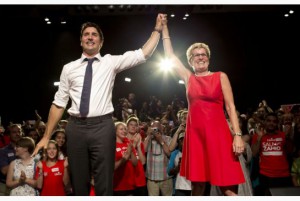A couple of years ago, my wife and I spent a week visiting Washington. It was a beautiful Fall week, and we took in all of the sights – the White House, the Capitol, the National Mall, all the Memorials and as much of the Smithsonian as we could cram into our visit. We dug deeply and broadly, and had a great holiday that was relaxing, educational and inspiring.
It was that last aspect of the experience that was most surprising and noteworthy. As Canadians, we tend to be very cynical about the mythology of America. We are right in their face; up that close, it easy to see the blemishes. But the treatment of the American story in Washington, and in particular at the American History Museum of the Smithsonian, is disarming. The dark side of American history – the overtly brutal conquest of their indigenous peoples, slavery, the Civil War, Jim Crow, Viet Nam – are neither hidden nor whitewashed. They are there in plain sight, and presented with a solemnity that is both apologetic and implies “we can and must do better”.
What struck me on that visit was the recognition that perhaps what the rest of the world in general and Canadians in particular miss when we dismiss Americans’ blithe patriotic claims to be “the greatest nation on the planet” is this: what makes America great is not what it is, was or ever will be, but what it aspires to be. It is the boldness and idealism of their reach that defines them as a unique global actor, notwithstanding the more than occasional venality of their grasp.
The Canadian ethos stands in stark contrast. It took almost one hundred years for Canada to assert an entirely independent worldview, and another fifty before we were bold enough to reclaim our own Constitution. Our ambition has always been modest, particularly so relative to our accomplishments in the context of the great military challenges that have arisen in our still brief history as a nation. Our grasp has consistently exceeded our reach.
It is that defining character that makes the agenda of the new Liberal government both appealing and disorienting. Reasonable people (myself included) were well aware that 25,000 Syrian refugees could not be relocated to Canada in 60 or even 90 days, and that the Liberals’ active and progressive agenda on climate change, infrastructure and relationship renewal with First Nations can’t be done with annual deficits under $10 billion and a return to a balanced budget by 2019. Nevertheless, we were still inspired by the aspiration. Even the Liberal campaign slogan of “better is always possible” was a far cry from the “doing the best we can with the cards we are dealt” that would better reflect our ambitions historically.
Americans are quick to reward those who over-promise and slower to punish those who under-deliver; Canadians have not been so inclined. It remains to be seen if the election of 2015 represents an about face in that cultural distinction or the basis for crushing buyer’s remorse.


